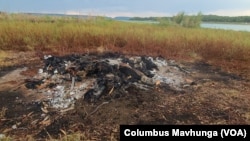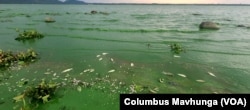A Zimbabwean national park is hosting relocated wildlife from a game park just outside the country's capital after an autopsy report on Saturday confirmed that four rhinos and several other animals died after drinking contaminated lake water.
Tinashe Farawo, the spokesperson for the Zimbabwe Parks and Wildlife Management Authority, confirmed to VOA the death of four rhinos after drinking bacteria-polluted water at Lake Chivero Recreational Park, about 20 kilometers west of the capital, Harare.
“We are not only losing the rhinos, but [we] also lost some zebras, wildebeest and some birds,” Farawo said.
“We have tried to treat some of the rhinos, but unfortunately it seems like we are not managing at the moment. But we have made some temporary collective measures to make sure we do the best we can with this challenge,” he said, referring to the temporary transfer of wildlife away from the lake.
“We need to continue to make sure that at least we deal with the issue of pollution around Lake Chivero,” Farawo said.
Amkela Sidange, spokesperson for the Environmental Management Agency of Zimbabwe, said that, nationwide, about 415 megaliters of untreated sewage are being discharged into the environment daily.
The “city of Harare on its own ... contributes about 219 megaliters of raw and partly treated sewer that is discharged into the environment on a daily basis, and that goes to show how huge the crisis is,” she said.
“We need the whole of government and societal approach,” Sidange said, adding that temporary solutions aren’t getting the job done.
Harare Mayor Jacob Mafume said he is counting on the central government to provide money to help the city provide proper sewer services, especially for those who live in “informal settlements.”
“We have over 150,000 informal settlements, and these informal settlements do not have sewer reticulation systems,” he said. “Therefore, their discharge is going straight into our water bodies.”
While the bickering continues among high-ranking officials about who is polluting Harare water with cyanobacteria, Farai Maguwu, director of the Center for Natural Resource Governance, is worried about the residents of Zimbabwe’s capital.
“There is a need to carry out scientific investigations about the water that is pumped into people’s homes by Harare city council and see if that water is still safe for drinking and inform the citizens of Harare accordingly,” Maguwu said.
On Tuesday, Mafume declared that Harare’s water was still meeting the World Health Organization’s standards and was safe for drinking.
The city council provides bottled water during its meetings and, for years now, many residents of Harare drink bottled water and water from boreholes.





